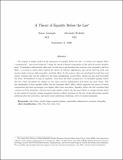A Theory of Equality Before the Law
Author(s)
Acemoglu, K. Daron; Wolitzky, Alexander
DownloadSubmitted version (345.3Kb)
Open Access Policy
Open Access Policy
Creative Commons Attribution-Noncommercial-Share Alike
Terms of use
Metadata
Show full item recordAbstract
<jats:title>Abstract</jats:title>
<jats:p>We propose a simple model of the emergence of equality before the law. A society can support effort (‘cooperation’, ‘prosocial behaviour’) using the carrot of future cooperation or the stick of coercive punishment. Community enforcement relies only on the carrot and involves low coercion, low inequality and low effort. A society in which elites control the means of violence supplements the carrot with the stick, and involves high coercion, high inequality and high effort. In this regime, elites are privileged by both laws and norms: because they are not subject to the same punishments as non-elites, norms are also more favourable for them. Nevertheless, it may be optimal—even from the elites’ perspective—to establish equality before the law, where all agents are subject to the same coercive punishments and norms are more equal. The key mechanism is that equality before the law increases elites’ effort, which improves the carrot of future cooperation and thus encourages even higher effort from non-elites. Equality before the law combines high coercion and low inequality. Factors that make equality before the law more likely to emerge include limits on the extent of coercion, greater marginal returns to effort, increases in the size of the elite group, greater political power for non-elites and, under some additional conditions, lower economic inequality.</jats:p>
Date issued
2021Department
Massachusetts Institute of Technology. Department of EconomicsJournal
Economic Journal
Publisher
Oxford University Press (OUP)